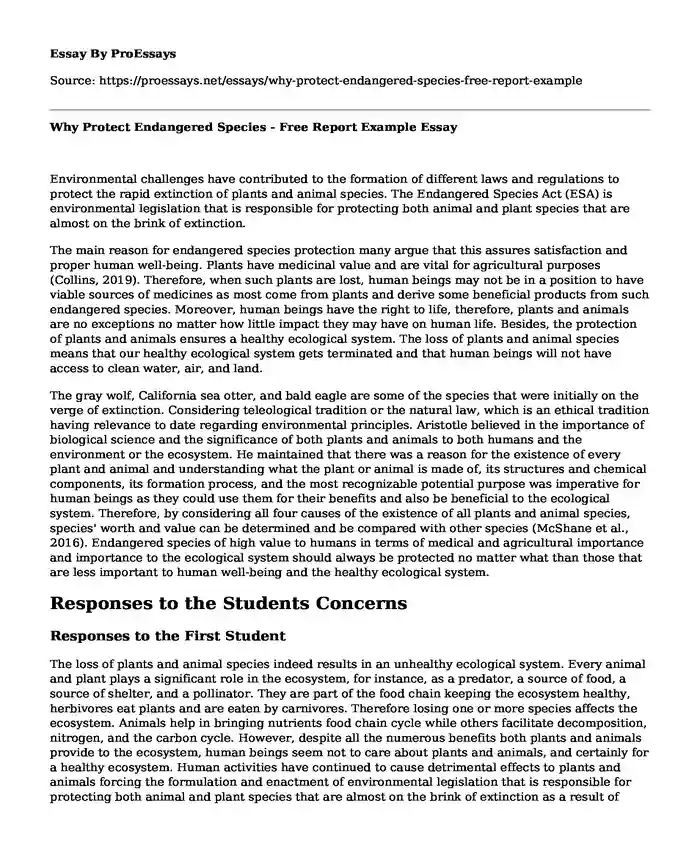Environmental challenges have contributed to the formation of different laws and regulations to protect the rapid extinction of plants and animal species. The Endangered Species Act (ESA) is environmental legislation that is responsible for protecting both animal and plant species that are almost on the brink of extinction.
The main reason for endangered species protection many argue that this assures satisfaction and proper human well-being. Plants have medicinal value and are vital for agricultural purposes (Collins, 2019). Therefore, when such plants are lost, human beings may not be in a position to have viable sources of medicines as most come from plants and derive some beneficial products from such endangered species. Moreover, human beings have the right to life, therefore, plants and animals are no exceptions no matter how little impact they may have on human life. Besides, the protection of plants and animals ensures a healthy ecological system. The loss of plants and animal species means that our healthy ecological system gets terminated and that human beings will not have access to clean water, air, and land.
The gray wolf, California sea otter, and bald eagle are some of the species that were initially on the verge of extinction. Considering teleological tradition or the natural law, which is an ethical tradition having relevance to date regarding environmental principles. Aristotle believed in the importance of biological science and the significance of both plants and animals to both humans and the environment or the ecosystem. He maintained that there was a reason for the existence of every plant and animal and understanding what the plant or animal is made of, its structures and chemical components, its formation process, and the most recognizable potential purpose was imperative for human beings as they could use them for their benefits and also be beneficial to the ecological system. Therefore, by considering all four causes of the existence of all plants and animal species, species' worth and value can be determined and be compared with other species (McShane et al., 2016). Endangered species of high value to humans in terms of medical and agricultural importance and importance to the ecological system should always be protected no matter what than those that are less important to human well-being and the healthy ecological system.
Responses to the Students Concerns
Responses to the First Student
The loss of plants and animal species indeed results in an unhealthy ecological system. Every animal and plant plays a significant role in the ecosystem, for instance, as a predator, a source of food, a source of shelter, and a pollinator. They are part of the food chain keeping the ecosystem healthy, herbivores eat plants and are eaten by carnivores. Therefore losing one or more species affects the ecosystem. Animals help in bringing nutrients food chain cycle while others facilitate decomposition, nitrogen, and the carbon cycle. However, despite all the numerous benefits both plants and animals provide to the ecosystem, human beings seem not to care about plants and animals, and certainly for a healthy ecosystem. Human activities have continued to cause detrimental effects to plants and animals forcing the formulation and enactment of environmental legislation that is responsible for protecting both animal and plant species that are almost on the brink of extinction as a result of indirect and direct human activities.
Response to the Second Student
Lack of information and awareness on the importance of both different animal and plant species living in different parts of the globe has led to a lack of actions that are geared towards protecting such animals and plant species found in very remote and hidden places and Polar Regions and are affected by our direct or indirect actions. Having absolute knowledge and awareness of the existence of such animal species in such an environment and the roles they play in a healthy ecosystem will enable humans not to refrain from activities that could directly or indirectly subject such animals and insects to extinction. Therefore, government and environmental agencies should provide education programs to citizens and people around the world, on the significance of protecting animal and plant species found in every part of the world. Additionally, activities that indirectly affect such animals should also be discouraged by the government. Finally, rolling out education programs in learning institutions will have a long-term effect in ensuring that future generations know the importance of animals and plant species and ways to protect them.
References
Collins, A. (2019). Why should we save endangered species? | GVI UK. Gvi.co.uk. Retrieved 16 September 2020, from https://www.gvi.co.uk/blog/why-should-we-save-endangered-species/.
McShane, K., Pojman, L., & Pojman, P. (2016). Environmental Ethics (7th ed., p. 800). Wadsworth Publishing.
Cite this page
Why Protect Endangered Species - Free Report Example. (2023, Dec 15). Retrieved from https://proessays.net/essays/why-protect-endangered-species-free-report-example
If you are the original author of this essay and no longer wish to have it published on the ProEssays website, please click below to request its removal:
- Dark Medicines: On Seeing Patients With "Bad Habits"
- Evidence-Based Medicine in Depression Essay Example
- Diabetes Testing Essay Example
- Preventing Infection and Safety Goals - Essay Sample
- Essay on Health Care Reform: A Century of Failed Attempts and a New Hope
- Paper Example on End-of-Life Preparedness: Acceptance, Orientation, and Aptitudes
- Essay Example on HIPAA Act: Ensuring Patients' Privacy and Easing Healthcare Administration







